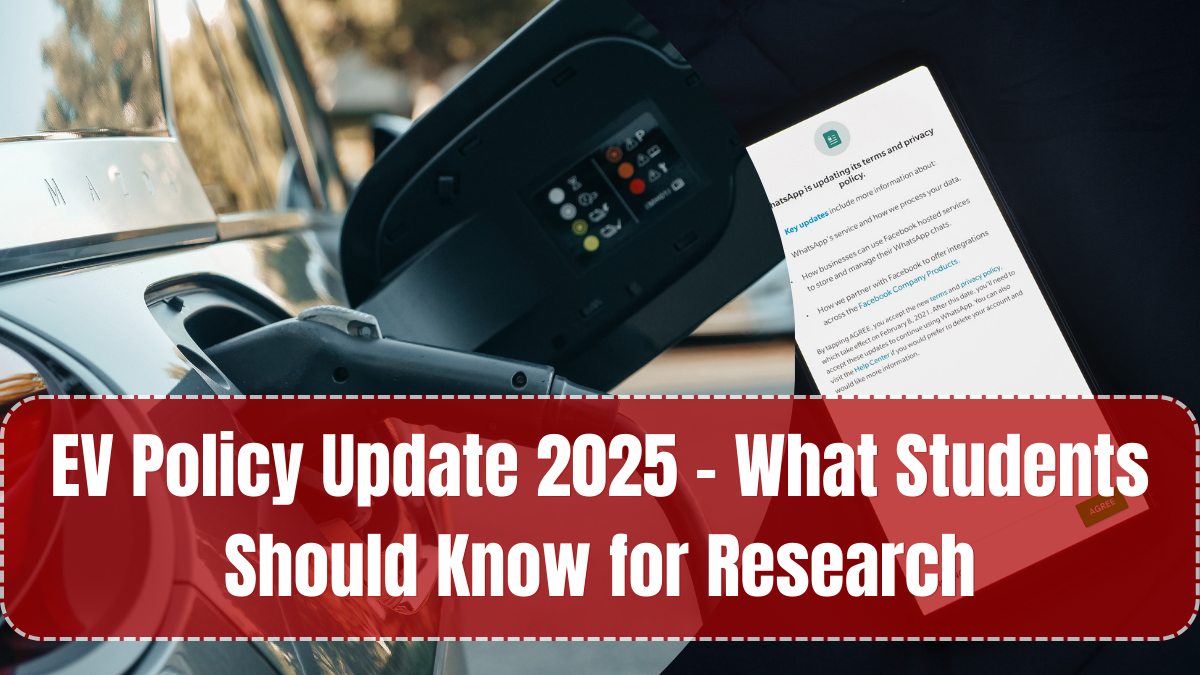The EV policy update India released in 2025 has introduced major shifts in the electric mobility landscape, directly impacting students, researchers, and institutions involved in electric vehicle (EV) studies. These updates aim to accelerate the adoption of electric transport, reduce dependency on fossil fuels, and encourage academic collaboration in EV innovation. With a stronger focus on youth-led research and entrepreneurship, the new EV policy framework opens up learning, funding, and innovation opportunities for engineering and science students across India.
The Ministry of Heavy Industries, in collaboration with the Ministry of Education, has restructured EV schemes to make them more inclusive of student participation in national development.

Key Highlights of the 2025 EV Policy Update
The latest EV policy update India introduces reforms designed to improve local EV production, charging infrastructure, and skill development. But for students, the most important changes include research incentives, project grants, and EV lab expansions in higher education institutions.
Highlights of the 2025 policy update:
-
₹700 crore allocated for student-led EV research grants
-
Integration of EV curriculum in 500+ engineering colleges
-
Mandatory EV lab setup in technical universities by 2026
-
Internship support for EV projects in MSMEs and startups
-
Scholarships for students working on zero-emission tech
-
Inclusion of EV modules in NEP 2020 education roadmap
These initiatives ensure that education and research become key pillars of India’s transition to sustainable mobility.
Opportunities for Students and Academic Institutions
The EV policy emphasizes that students are not just learners but contributors to India’s EV ecosystem. As a result, institutions are receiving funds to develop EV innovation hubs, test benches, and virtual simulators. Faculty are also encouraged to guide student patents and publish government-recognized papers on electric mobility.
Opportunities now available to students:
-
Final-year project funding from DST and AICTE
-
Participation in national-level EV hackathons and challenges
-
Incubation support for EV-based startups within college campuses
-
Academic credit for working on industry-aligned EV policy projects
-
Exposure to government-funded EV pilot programs
This direct engagement allows students to not only learn but shape the direction of India’s EV policy update India.
EV Policy and Its Impact on Curriculum and Exams
With the EV policy driving education changes, 2025 has seen a major update in how EV topics are integrated into college syllabi. AICTE has approved elective courses and modules on EV battery management, e-mobility systems, and sustainability audits. These are now being taught as part of core or minor tracks in various education institutes.
Curriculum and academic changes include:
-
EV engineering as an elective in BTech Mechanical, Electrical, and Mechatronics
-
EV policy analysis part of BA (Public Policy) and MA (Sustainability) courses
-
Case study-based questions in competitive exams like GATE, UPSC, and UGC-NET
-
Online courses on EV standards, charging infrastructure, and public planning
These updates bridge classroom learning with real-world energy and transport challenges.
Government and Industry Collaboration for EV Research
The EV policy update India promotes public-private-academic collaboration for faster innovation. Students now get hands-on opportunities through internships in EV companies and projects sponsored by the Department of Science and Technology, NITI Aayog, and Ministry of Road Transport.
Government support for student-led EV research:
-
₹50 crore Innovation Challenge Fund for student ideas
-
NITI Aayog-supported EV accelerator for early-stage student startups
-
AICTE internship portal lists EV companies offering summer training
-
Technical partnerships with Tata Power, Ather, Mahindra Electric, and Ashok Leyland
-
Free access to public datasets on battery health and vehicle usage
The emphasis is clear: empower India’s youth to fuel the next generation of green transport solutions.
FAQs
What is the EV policy update India about?
The EV policy update India is a 2025 reform that promotes electric vehicle adoption by offering incentives to students, institutions, and EV startups, with a strong focus on academic integration.
How does the policy help students?
It offers funding, research grants, and curriculum integration to support education and student innovation in the EV sector.
Are internships available under this policy?
Yes, students can now apply for government-supported internships at EV startups and MSMEs aligned with the EV policy framework.
Which courses include EV topics now?
Engineering, public policy, and science programs now offer modules on battery systems, sustainability, and EV policy evaluation.
Can students get funding for their EV projects?
Absolutely. The government has allocated over ₹700 crore in 2025 for student projects, innovation labs, and EV-based education initiatives.
Click here to know more.
